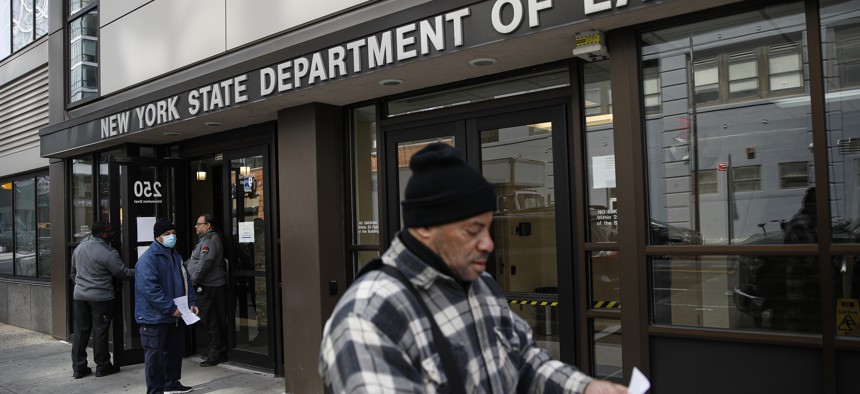Four States Have Borrowed Money to Pay Unemployment Benefits

In this March 18, 2020 file photo, visitors to the Department of Labor are turned away at the door by personnel due to closures over coronavirus concerns in New York. AP Photo/John Minchillo

Connecting state and local government leaders
Thirty-six states borrowed from the federal government after the Great Recession, which over time led some to restrict unemployment benefits.
Four states have had to borrow money from the federal government in order to pay unemployment compensation—a scenario experts believe most if not all states will face as they drain their own unemployment trust funds to pay the onslaught of claims filed as people are forced out of work during the coronavirus outbreak.
Ohio Governor Mike DeWine announced last week the state had sought authorization to borrow up to $3.1 billion, though he said it was unlikely that much would be needed. Since March 15, the state has paid out $3.8 billion in unemployment compensation to more than 683,000 Ohioans.
When states exhaust their own unemployment trust funds, they are allowed to borrow money from the U.S. Labor Department to ensure benefits continue to be paid. California, New York and Texas have also borrowed money and another seven states have had borrowing requests approved. The federal government has approved more than $22 billion in borrowing authority to the states so far.
After the Great Recession, 36 states borrowed from the federal unemployment insurance trust fund, according to the Tax Policy Center at the Brookings Institution. This time around, all 50 states may have to borrow money in order to continue paying unemployment benefits, said Michele Evermore, senior researcher with the National Employment Law Project.
States had more money in their unemployment trust funds ahead of the coronavirus pandemic than when the Great Recession started, she said. Before the pandemic took hold in the United States, about 30 states met the Department of Labor’s guidelines for having unemployment trust funds that were considered to be solvent, or sufficiently funded to cover benefits. But with more than 45 million jobless claims filed over the last three months, experts said even states that were solvent may not have enough money to cover the costs.
“This is unique because the claims came all at once,” said Andrew Stettner, a senior fellow at The Century Foundation. “You don’t typically have the borrowing happen in the first four months of a recession.”
To avoid taking on debt, there has been some discussion among state leaders of using federal coronavirus relief funding to pay for unemployment benefits.
In Rhode Island, one business group estimates the state’s unemployment insurance trust fund, which began the year with a $538 million balance, will run dry by September. Michael DiBiase, the president of the Rhode Island Public Expenditure Council and head of the state’s Department of Administration, said the state should look into using a portion of the $1.25 billion federal aid it received from the CARES Act to pay for the system, the Providence Journal reported.
Any debt that states take on to pay unemployment benefits must be paid back through employer payroll taxes that fund the system.
“Eventually the principle will have to be paid back and the employers in the state will have to pay it back through higher taxes and they get very anxious about that,” Stettner said.
The high level of borrowing during the recession led some states to cut their unemployment benefits or limit access to them, something experts said could happen again given the high level of unemployment claims across the country.
Some states reduced the length of time people were eligible for unemployment benefits, with nine states reducing the maximum amount of time a person could receive benefits from 26 weeks to as few as 12 weeks. Others created administrative requirements that made it more difficult for some people to qualify for unemployment, Evermore said.
At the beginning of the pandemic, the hurdles states had created and required people to clear in order to get benefits came under scrutiny, as desperate workers suddenly thrown out of their jobs were finding it hard to apply for unemployment.
Evermore said she worries that if states have to borrow large amounts of money from the federal government to keep paying unemployment benefits that they will face “extreme pressure” from employers to cut benefits again.
Andrea Noble is a staff correspondent with Route Fifty.

NEXT STORY: Same Mission, Different Pay for National Guard




